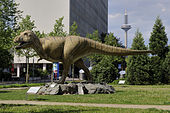reptile
Appearance
English
[edit]Etymology
[edit]From Middle English reptil, from Old French reptile, from Late Latin rēptile, neuter of reptilis (“creeping”), from Latin rēpō (“to creep”), from Proto-Indo-European *rep- (“to creep, slink”) (Pokorny; Watkins, 1969).
| Picture dictionary | ||||||||
|---|---|---|---|---|---|---|---|---|
|
Pronunciation
[edit]- (Received Pronunciation) IPA(key): /ɹɛpˈtaɪl/
Audio (Southern England): (file)
- (General American) IPA(key): /ˈɹɛp.taɪl/, /ˈɹɛp.taɪəl/
- Rhymes: -aɪl
Noun
[edit]reptile (plural reptiles)
- (strictly) A cold-blooded vertebrate of the class Reptilia; an amniote that is neither a synapsid nor a bird; excludes amphibians. [from 19th c.]
- (loosely, historical) A reptile or amphibian. [from 18th c.]
- (figuratively, dated) A mean, grovelling, loathsome or repulsive person.
- 1749, Henry Fielding, The History of Tom Jones, a Foundling, volume (please specify |volume=I to VI), London: A[ndrew] Millar, […], →OCLC:
- This work may, indeed, be considered as a great creation of our own; and for a little reptile of a critic to presume to find fault with any of its parts, without knowing the manner in which the whole is connected, and before he comes to the final catastrophe, is a most presumptuous absurdity.
- 1836 March – 1837 October, Charles Dickens, “(please specify the chapter name)”, in The Posthumous Papers of the Pickwick Club, London: Chapman and Hall, […], published 1837, →OCLC:
- "That reptile," whispered Pott, catching Mr. Pickwick by the arm, and pointing towards the stranger. "That reptile — Slurk, of the Independent!"
- 1847 December, Ellis Bell [pseudonym; Emily Brontë], chapter XXVII, in Wuthering Heights: […], volume (please specify |volume=I or II), London: Thomas Cautley Newby, […], →OCLC:
- […] If I pitied you for crying and looking so very frightened, you should spurn such pity. Ellen, tell him how disgraceful this conduct is. Rise, and don’t degrade yourself into an abject reptile—don’t!
Hypernyms
[edit]Hyponyms
[edit]- See also Thesaurus:reptile
Related terms
[edit]- mammal-like reptile
- Reptilia
- reptilian
- reptilianness
- reptiloid
- reptilology
- reptilologist
- reptoid
- reptologist
Translations
[edit]a cold-blooded vertebrate
|
Adjective
[edit]reptile (not comparable)
- Creeping; moving on the belly, or by means of small and short legs.
- Grovelling; low; vulgar.
- a reptile race or crew reptile vices
- 1795–1797, Edmund Burke, “(please specify |letter=1 to 4)”, in [Letters on a Regicide Peace], London: [Rivington]:
- There is also a false, reptile prudence, the result not of caution, but of fear.
- 1800, S[amuel] T[aylor] Coleridge, “Christabel. Part II.”, in Christabel: Kubla Khan, a Vision: The Pains of Sleep, London: […] John Murray, […], by William Bulmer and Co. […], published 1816, →OCLC, page 34:
- My herald shall appoint a week, / And let the recreant traitors seek / My tournay court—that there and then / I may dislodge their reptile souls / From the bodies and forms of men!
Synonyms
[edit]- (creeping, crawling): reptilious, creeping, crawling; reptitious (obsolete)
- (contemptible): See Thesaurus:despicable
See also
[edit]- herpetology
- Category:en:Reptiles for a list of reptiles in English
reptile on Wikipedia.Wikipedia
Anagrams
[edit]French
[edit]Etymology
[edit]Pronunciation
[edit]Noun
[edit]reptile m (plural reptiles)
Derived terms
[edit]Descendants
[edit]- → Romanian: reptilă
Further reading
[edit]- “reptile”, in Trésor de la langue française informatisé [Digitized Treasury of the French Language], 2012.
Latin
[edit]Etymology
[edit]Substantivized neuter of rēptilis (“creeping”), taken from the phrase animal rēptile.
Pronunciation
[edit]- (Classical Latin) IPA(key): /ˈreːp.ti.le/, [ˈreːpt̪ɪɫ̪ɛ]
- (modern Italianate Ecclesiastical) IPA(key): /ˈrep.ti.le/, [ˈrɛpt̪ile]
Noun
[edit]rēptile n (genitive rēptilis); third declension
- (Late Latin) a reptile
Declension
[edit]Third-declension noun (neuter, “pure” i-stem).
| singular | plural | |
|---|---|---|
| nominative | rēptile | rēptilia |
| genitive | rēptilis | rēptilium |
| dative | rēptilī | rēptilibus |
| accusative | rēptile | rēptilia |
| ablative | rēptilī | rēptilibus |
| vocative | rēptile | rēptilia |
Descendants
[edit]- → English: reptile
- → French: reptile
- → German: Reptil
- → Norwegian Bokmål: reptil
- → Spanish: reptil
- → Swedish: reptil
References
[edit]- rēptilis in Gaffiot, Félix (1934) Dictionnaire illustré latin-français, Hachette.
- rēptilis in Georges, Karl Ernst, Georges, Heinrich (1913–1918) Ausführliches lateinisch-deutsches Handwörterbuch, 8th edition, volume 2, Hahnsche Buchhandlung
- “rēptilis”, in Charlton T. Lewis and Charles Short (1879) A Latin Dictionary, Oxford: Clarendon Press
- R. E. Latham, D. R. Howlett, & R. K. Ashdowne, editors (1975–2013), “rēptilis”, in Dictionary of Medieval Latin from British Sources[1], London: Oxford University Press for the British Academy, →ISBN, →OCLC
Categories:
- English terms inherited from Middle English
- English terms derived from Middle English
- English terms derived from Old French
- English terms derived from Late Latin
- English terms derived from Latin
- English terms derived from Proto-Indo-European
- Visual dictionary
- English 2-syllable words
- English terms with IPA pronunciation
- English terms with audio pronunciation
- English 3-syllable words
- Rhymes:English/aɪl
- Rhymes:English/aɪl/2 syllables
- English lemmas
- English nouns
- English countable nouns
- English terms with historical senses
- English dated terms
- English terms with quotations
- English adjectives
- English uncomparable adjectives
- English terms with usage examples
- en:Reptiles
- French terms borrowed from Latin
- French terms derived from Latin
- French 2-syllable words
- French terms with IPA pronunciation
- French terms with audio pronunciation
- French lemmas
- French nouns
- French countable nouns
- French masculine nouns
- Latin 3-syllable words
- Latin terms with IPA pronunciation
- Latin lemmas
- Latin nouns
- Latin third declension nouns
- Latin neuter nouns in the third declension
- Latin neuter nouns
- Late Latin








